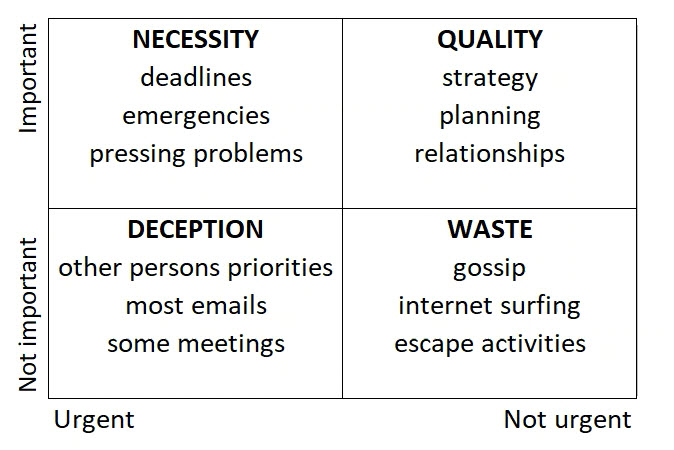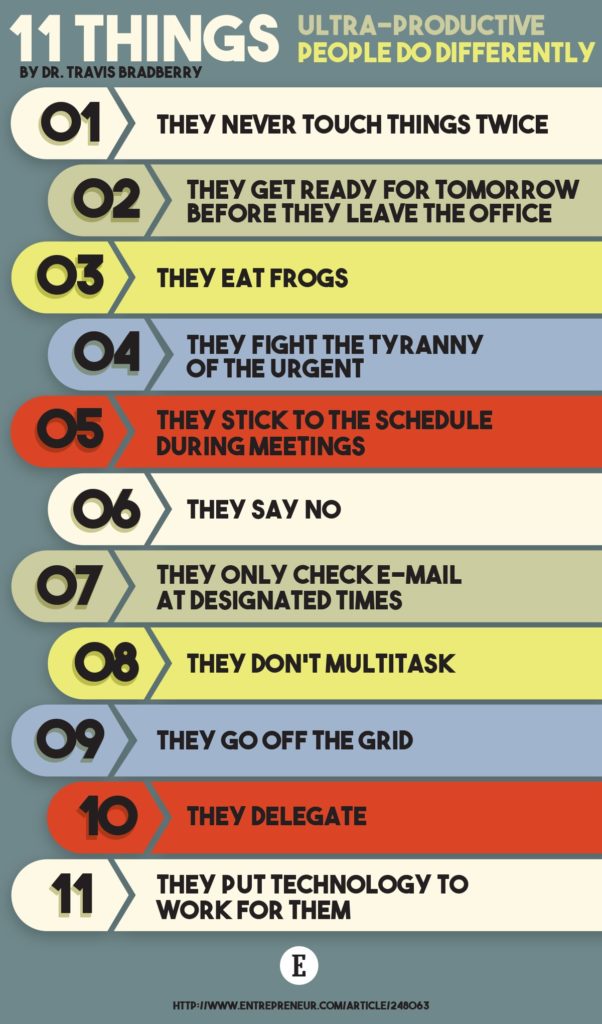
Everyone I know recognises they sometimes don’t have enough time to get stuff done. Some people however always seem to be time poor. In this article I’m going to mention four different strategies that I’ve seen help people make better use of their time, but the real clincher that could make any of them work for anyone comes at the end. Here’s my take on why some of us struggle to get on top of managing our time and what can be done about it.
First let’s look at four simple methods that have helped quite a few of my clients. They each share a common principle by framing the problem as priority management rather than time management.
Coveys time matrix. This basically says that every task has a level of urgency and a level of importance. If you score each task in terms of both these parameter you can place them in a four square grid like this:

Many people think time is spent most efficiently in the top left box (the quadrant of Necessity) doing high importance – high urgency tasks. Covey disagrees and says neglecting the high importance – low urgency quadrant leads to inefficient use of time. He calls this the quadrant of Quality because these activities tend towards achieving long term goals and building a better business or life. They include stuff like planning, building relationships, training people etc. which, if done well, are likely to reduce the need to spend too much time in the Necessity quadrant.
Covey is quite blunt about the remaining two quadrants which include a range of “discretionary” activities. He calls them the quadrants of Deception and Waste. While acknowledging that everyone spends time on unimportant stuff, he argues that people who spend too much time doing this live irresponsible lives. He suggests spending less time in these quadrants and reallocating it to the Quality quadrant. If you choose to do this you will find that you’re doing more forward thinking, being better organised and spending less time in the Necessity quadrant putting out fires, dealing with stress and guess what? You may find even more time to spend in the Quality quadrant which incidentally includes activities such as being with family and friends. You can find out how to use Coveys matrix here.
Must, Should Could. These are just simple prioritisation criteria. Every time you’re faced with another task, ask yourself where it fits in terms of these categories. Quite often you may be distracted by the Could Do stuff because you either enjoy it (but its not particularly important) or you’re subconsciously seeking a distraction from harder and/or more unpleasant Must Do stuff. Some of the Could Do tasks might never get done (because they’ll never be important) but others might bubble up to the Should or Must categories. If this is the case try and nail them while they’re a Should Do rather than a Must Do. Only do the Could Do stuff if you have time after addressing the Must and Should priorities.
Four Russian brothers. These fine fellows can help make sure you’re focusing on the right stuff. Their names are:
Morov. What can you be doing “more of”?
Lessov. What should you be doing “less of”?
Ridov. What should you stop doing?
Tossin. – What new things should you toss in to your daily life that would make you better at what you do?
The Russian brothers are very good at helping you improve your overall efficiency and effectiveness by helping you to focus on what is important.
Saying No. This can be a big challenge for many people because most of us like to help others or believe we can do things better or more quickly than others. Often its about delegation and many years ago the Harvard Business Review published a great article on this dilemma and how to deal with it. You can read it here to make sure you’re not caught out with someone else’s monkey.
Belief and behaviour: So with these and many other time management/prioritisation methods, why do so many of us still find it difficult to get on top of our workloads? I think the core problem lies between our ears and not on our desks or in the workshop: Its one of negative self-belief which too often centres on “I’m not good at managing my time”. To fix this you can employ a bit of basic psychology, something I call the belief behaviour model. This is how it works:
You are what you believe because your beliefs influence your behaviour which influences your actions which drive your outcomes. If you think that you can’t manage your time, your behaviour will reflect this, you won’t get stuff done and guess what? You’ve just confirmed your belief.
By prioritising, delegating or simply saying No, you can remove some tasks from your list but there will always by some that remain. Whether you get these done or not is largely a reflection of your belief so if you start believing you can prioritise your time, you’ll start behaving accordingly and you’ll be a long way towards being a good time manager.
Finally, I recently came across this article on how ultra-productive people behave differently. Here's a summary:

So, if you adopt these behaviours and change your beliefs you could start getting more stuff done, perhaps in even less time than you now think possible.
Try applying the belief behaviour model to other aspects of your life and you may be surprised at what you can achieve.